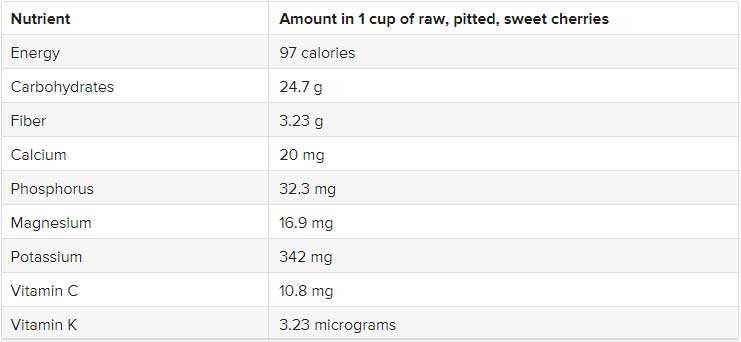
Cherries contain a number of beneficial nutrients, such as vitamin C and antioxidants. Some evidence suggests that they may also help lower inflammation, protect heart health, and improve sleep as part of a healthy diet.
The health benefits of cherries can depend on a number of factors, such as the cherry variety, how many a person consumes, and how often they consume them.
This article will look at the scientific evidence for the health benefits of cherries, their nutritional profile, and how people can get more cherries in their diet.
1. Benefits for inflammation
Inflammation is part of the body’s natural response to illness or injury. In the short term, it can be helpful. However, long-term inflammation is involved in many chronic conditions.
Although a diet that is generally high in fruits, vegetables, and fiber can help lower inflammation, cherries may be particularly beneficial as part of an anti-inflammatory diet.
According to a 2018 review, 11 out of 16 human studies into cherries and inflammation showed that they decreased inflammation. This applied to both tart and sweet varieties of cherry, and it included cherry fruits, juices, and concentrates.
2. Benefits for gout
The anti-inflammatory properties of cherries may also help with gout.
Gout causes sudden and severe joint pain. This is triggered by high levels of uric acid in the blood. One 2018 review stated that the consumption of cherries could help a person maintain moderate levels of uric acid in the body.
The review discussed a 2012 study that found that taking cherry concentrate or eating cherries led to a 35% reduction in gout episodes over a 2-day period. This effect remained the same regardless of sex, body weight, purine and alcohol intake, diuretic use, and anti-gout medication use.
The authors of the 2018 review stated that although more long-term studies are necessary, these findings are promising.
3. Benefits for heart health
In general, a diet rich in fruits and vegetables and low in saturated fat is best for heart health. However, cherries may be especially valuable in a heart-healthy diet, as they show potential for lowering blood pressure.
The 2018 review mentioned several studies in which various cherry products lowered blood pressure. One such older study in females with diabetes found that taking 40 grams (g) of tart cherry concentrate per day for 6 weeks significantly lowered blood pressure.
High blood pressure is a significant risk factor for cardiovascular disease. According to the World Health Organization (WHO), cardiovascular disease is the leading cause of death worldwide.
Cherries contain several nutrients that may help with blood pressure, including polyphenols and potassium.
Polyphenols are a type of antioxidant that can prevent oxidative damage. A large 2018 observational study suggested that increased polyphenol consumption could lower blood pressure.
One hundred grams of raw sweet cherries contains around 5% of a person’s Daily Value of potassium, which is 4,700 milligrams (mg). An adequate intake of potassium is important for maintaining healthy blood pressure.
4. Benefits for sleep
According to a 2013 study, cherries are a rich, natural source of melatonin, which is a neurotransmitter that influences sleep and mood. Melatonin can be useful for those who have insomnia, as it is the chemical that induces sleepiness.
Another 2013 study involved participants aged between 20 and 85 years. Among other outcomes, the researchers studied the effects on sleep of those who ate a cherry-based product and those who had a placebo.
Among the participants who consumed the cherry-based product, sleep and nocturnal rest significantly improved. Older participants experienced an even more marked improvement.
5. Benefits for exercise recovery
Regular exercise is an important part of a healthy lifestyle. However, it can result in sore muscles or, if a person exercises in a way that causes strain, injury.
A 2020 meta-analysis involved participants who consumed tart cherry concentrate as a powder or juice for 7 days until 1.5 hours before exercising.
The results revealed that tart cherry consumption improved a person’s endurance during exercise. This was possibly due to its low glycemic index and anti-inflammatory, anti-oxidative, and blood flow-enhancing properties.
Scientists need to carry out more research to determine whether or not cherries can reduce recovery times and soreness after exercise.
Nutritional Value

In addition to having specific health benefits, cherries are also a source of many important nutrients.
The following table shows the quantities of some of the nutrients in sweet cherries, according to the United States Department of Agriculture:
The Dietary Guidelines for Americans 2020–2025 recommend that most healthy adults eat 1.5–2.5 cups of fruit per day, depending on their calorie intake needs.
How To Get More Cherries In The Diet
There are many ways to get more cherries into the diet. Cherries are available in many forms, including:
- raw fruit
- dried fruit
- fruit compote or puree
- fruit juice
- concentrate, which a person dilutes with water
- powder
To incorporate more cherries into a healthy diet, people can:
- Add fresh cherries to fruit salads, smoothies, oatmeal, and yogurt.
- Add dried cherries to fruit and nut mixes, cereals, muesli, and granolas.
- Pair cherries with savory foods, such as salads, cheeses, seafood, or pork.
- Use cherry puree or compote in dressings, sauces, and condiments.
- Add cherry powder or cherry concentrate to smoothies.
When purchasing cherry products or using cherries in recipes, people should try to avoid added sugars. Some cherry products contain high amounts of added sugars.
Summary
There is some evidence to suggest that regularly eating cherries or drinking cherry juice may benefit a person’s heart health, boost sleep quality, and lower inflammation. People with specific conditions, such as high blood pressure or gout, may find them especially helpful.
However, as with all aspects of nutrition, there are no specific foods that can cure a condition. This is because many factors influence a person’s health, including their overall diet, fitness level, mental health, and genes.
People will get the most benefits from cherries by eating them as part of a healthy diet and lifestyle.
Sources:
- Adriouch, S., et al. (2018). Prospective association between total and specific dietary polyphenol intakes and cardiovascular disease risk in the Nutrinet-Santé French cohort.
https://www.ncbi.nlm.nih.gov/pmc/articles/PMC6266343/ - Ataie-Jafari, A., et al. (2008). Effects of sour cherry juice on blood glucose and some cardiovascular risk factors improvements in diabetic women: A pilot study [Abstract].
https://www.emerald.com/insight/content/doi/10.1108/00346650810891414/full/html - Cardiovascular diseases. (n.d.).
https://www.who.int/health-topics/cardiovascular-diseases#tab=tab_1 - Daily Value on the new nutrition and supplement facts labels. (2020).
https://www.fda.gov/food/new-nutrition-facts-label/daily-value-new-nutrition-and-supplement-facts-labels - Dietary Guidelines for Americans 2020–2025. (n.d.).
https://www.dietaryguidelines.gov/sites/default/files/2021-03/Dietary_Guidelines_for_Americans-2020-2025.pdf - Gao, R., et al. (2020). Effect of tart cherry concentrate on endurance exercise performance: A meta-analysis [Abstract].
https://pubmed.ncbi.nlm.nih.gov/31986108/ - Garrido, M., et al. (2013). A Jerte valley cherry product provides beneficial effects on sleep quality. Influence on aging [Abstract].
https://pubmed.ncbi.nlm.nih.gov/23732552/ - Kelley, D. S., et al. (2018). A review of the health benefits of cherries.
https://www.ncbi.nlm.nih.gov/pmc/articles/PMC5872786/ - Lopez, E. O., et al. (2021). Cardiovascular disease.
https://www.ncbi.nlm.nih.gov/books/NBK535419/ - Sur, M., et al. (2021). Potassium.
https://www.ncbi.nlm.nih.gov/books/NBK539791/ - U.S. Department of Agriculture, Agricultural Research Service. (2019). FoodData Central.
http://fdc.nal.usda.gov/ - Zhang, Y., et al. (2012). Cherry consumption and the risk of recurrent gout attacks.
https://www.ncbi.nlm.nih.gov/pmc/articles/PMC3510330/ - Zhao, C.-N., et al. (2017). Fruits for prevention and treatment of cardiovascular diseases.
https://www.ncbi.nlm.nih.gov/pmc/articles/PMC5490577/ - Zhao, Y., et al. (2013). Melatonin and its potential biological functions in the fruits of sweet cherry [Abstract].
https://pubmed.ncbi.nlm.nih.gov/23480341/
Important Notice: This article was originally published at www.medicalnewstoday.com by Mathieu Rees where all credits are due. Medically reviewed by Amy Richter, RD.
Disclaimer
The watching, interacting, and participation of any kind with anything on this page does not constitute or initiate a doctor-patient relationship with Dr. Farrah®. None of the statements here have been evaluated by the Food and Drug Administration (FDA). The products of Dr. Farrah® are not intended to diagnose, treat, cure, or prevent any disease. The information being provided should only be considered for education and entertainment purposes only. If you feel that anything you see or hear may be of value to you on this page or on any other medium of any kind associated with, showing, or quoting anything relating to Dr. Farrah® in any way at any time, you are encouraged to and agree to consult with a licensed healthcare professional in your area to discuss it. If you feel that you’re having a healthcare emergency, seek medical attention immediately. The views expressed here are simply either the views and opinions of Dr. Farrah® or others appearing and are protected under the first amendment.
Dr. Farrah® is a highly experienced Licensed Medical Doctor certified in evidence-based clinical nutrition, not some enthusiast, formulator, or medium promoting the wild and unrestrained use of nutrition products for health issues without clinical experience and scientific evidence of therapeutic benefit. Dr. Farrah® has personally and keenly studied everything she recommends, and more importantly, she’s closely observed the reactions and results in a clinical setting countless times over the course of her career involving the treatment of over 150,000 patients.
Dr. Farrah® promotes evidence-based natural approaches to health, which means integrating her individual scientific and clinical expertise with the best available external clinical evidence from systematic research. By individual clinical expertise, I refer to the proficiency and judgment that individual clinicians acquire through clinical experience and clinical practice.
Dr. Farrah® does not make any representation or warranties with respect to the accuracy, applicability, fitness, or completeness of any multimedia content provided. Dr. Farrah® does not warrant the performance, effectiveness, or applicability of any sites listed, linked, or referenced to, in, or by any multimedia content.
To be clear, the multimedia content is not intended to be a substitute for professional medical advice, diagnosis, or treatment. Always seek the advice of your physician or other qualified health providers with any questions you may have regarding a medical condition. Never disregard professional medical advice or delay in seeking it because of something you have read or seen in any website, video, image, or media of any kind. Dr. Farrah® hereby disclaims any and all liability to any party for any direct, indirect, implied, punitive, special, incidental, or other consequential damages arising directly or indirectly from any use of the content, which is provided as is, and without warranties.








